The Mediterranean Diet 101
If you are looking for the healthiest diet on the planet, then the Mediterranean diet might be it.
After reading this post you are going to learn:
- What foods are included Mediterranean Diet,
- A simple Mediterranean diet shopping list, and
- The health benefits of eating the Mediterranean diet.
Let’s dive right in.
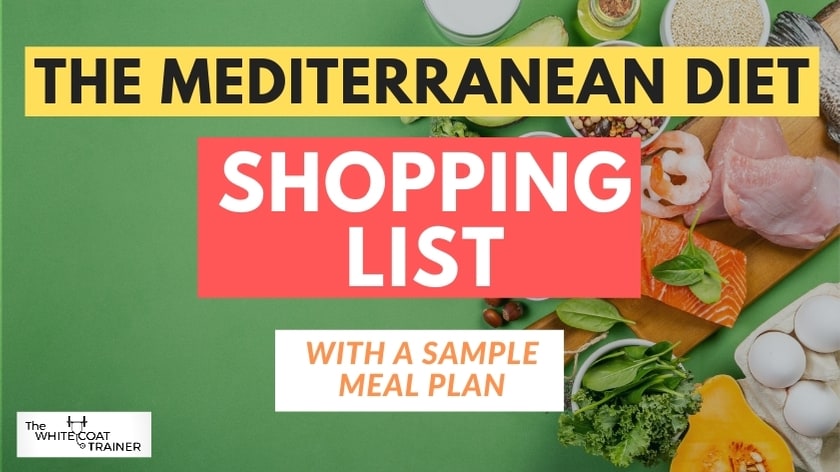
What Does The Mediterranean Diet Consist Of?
The Mediterranean diet has been quoted by many to be the healthiest diet of all time.
So what does it actually consist of?
The basic principles of the Mediterranean diet are
- Eat more vegetables
- Consume more fish
- Eat fruit for dessert
- Consume whole grains, legumes, beans, and nuts
- Use olive oil abundantly
- Consume less red meat
- Use herbs and spices in place of salt
Interestingly, no foods are actually forbidden.
The Mediterranean diet simply gives you recommendations of which foods you should eat more of, and which you should eat less.
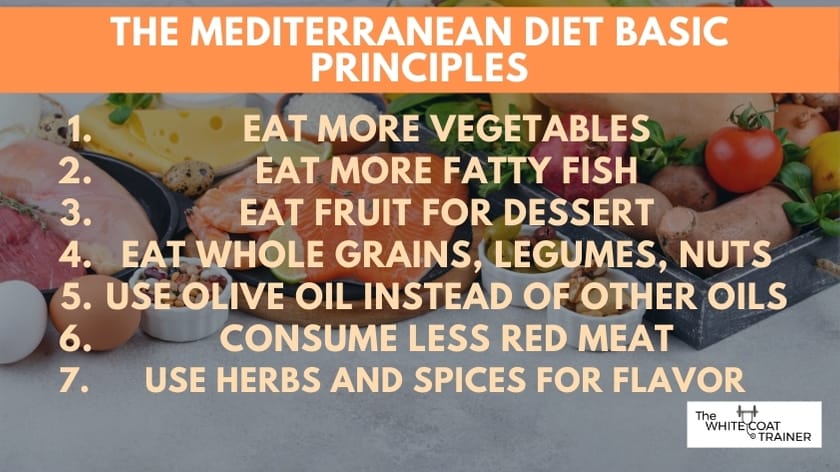
The Mediterranean Diet Food List & Pyramid
Proponents of the Mediterranean diet have also created a pyramid that can be used as a guideline to how you should base your eating.
At the very bottom of the pyramid is by far the most important aspect of living a healthy life.
Level 1 of the Mediterranean Diet Pyramid: Physical activity, Movement, and Social Interaction
Movement is ingrained in our DNA. We are meant to be active.
Unfortunately, all of the technology we have in our world today promotes sedentary living.
If you didn’t already know, inactivity is really dangerous.
So much so, that we wrote an entire post on The Detrimental Effects of Prolonged Sitting and 8 Ways to Combat It.
Without this base, you will not be able to optimize your health.
In addition, humans are social creatures. Even introverts (like myself), require social interaction from time to time.
If you can, try and consume at least one meal per day with other people.
Level 2 of the Mediterranean Diet Pyramid: The Staple Foods
The next section of the pyramid describes the foods that should be abundant in your diet. It is recommended that you consume something from each of these categories every single day.
- Vegetables,
- Fruits,
- Nuts,
- Olive oil,
- Seeds,
- Whole grains,
- Legumes.
These foods constitute the base of the pyramid because they are the most nutrient-dense foods on the planet.
Far too many people are focused on the calorie content of a particular food, and not the nutrient content.
Our body NEEDS numerous vitamins and minerals to thrive.
The only way that you will get them is through a diet that is rich in these food groups.
Level 3 of the Mediterranean Diet Pyramid: Fish and Seafood
The second food category that the Mediterranean diet emphasizes is fish and seafood.
As per the Mediterranean protocol, you should consume fish at least twice a week.
Focus on the kinds that are high in omega-3 fatty acids. These include herring, salmon, tuna, halibut, and sardines.
As always, make sure that you purchase the wild caught varieties and not the conventionally farmed raised varieties.
Level 4 of the Mediterranean Diet Food Pyramid: Eggs, Dairy and Poultry
The next level of the Mediterranean pyramid is reserved for the foods that are very prevalent in the Western diet.
This includes poultry, eggs, milk and dairy products such as cheese and yogurt. The recommendation is to consume these foods in moderate portions.
In other words, you can consume them daily (or weekly), but in small quantities.
What is moderate? It depends on who you ask, but here are some pretty safe numbers.
~No more than 3-4 oz of organic pasture-raised chicken per day
~No more than 2 organic cage-free eggs per day
~No more than 1 cup of grass-fed whole milk per day
~No more than 3 oz of cheese per day
~No more than 6 oz of yogurt (greek yogurt is better) per day
It goes over which foods you should maximize, which ones you should minimize, and which ones you should avoid.
Level 5 of the Mediterranean Diet Food Pyramid: Meats and Sweets
The fifth and final level of the pyramid is where the Mediterranean diet differs from many other popular diets.
It understands the importance of balance, as it allows you to consume foods that are typically prohibited.
This level contains meats (beef, turkey, pork etc) and sweets (cookies, cakes, doughnuts etc).
You can have them, but eat them at your discretion. The recommendation is simply to eat them in small amounts.
In general, only consume these items a few times per month.
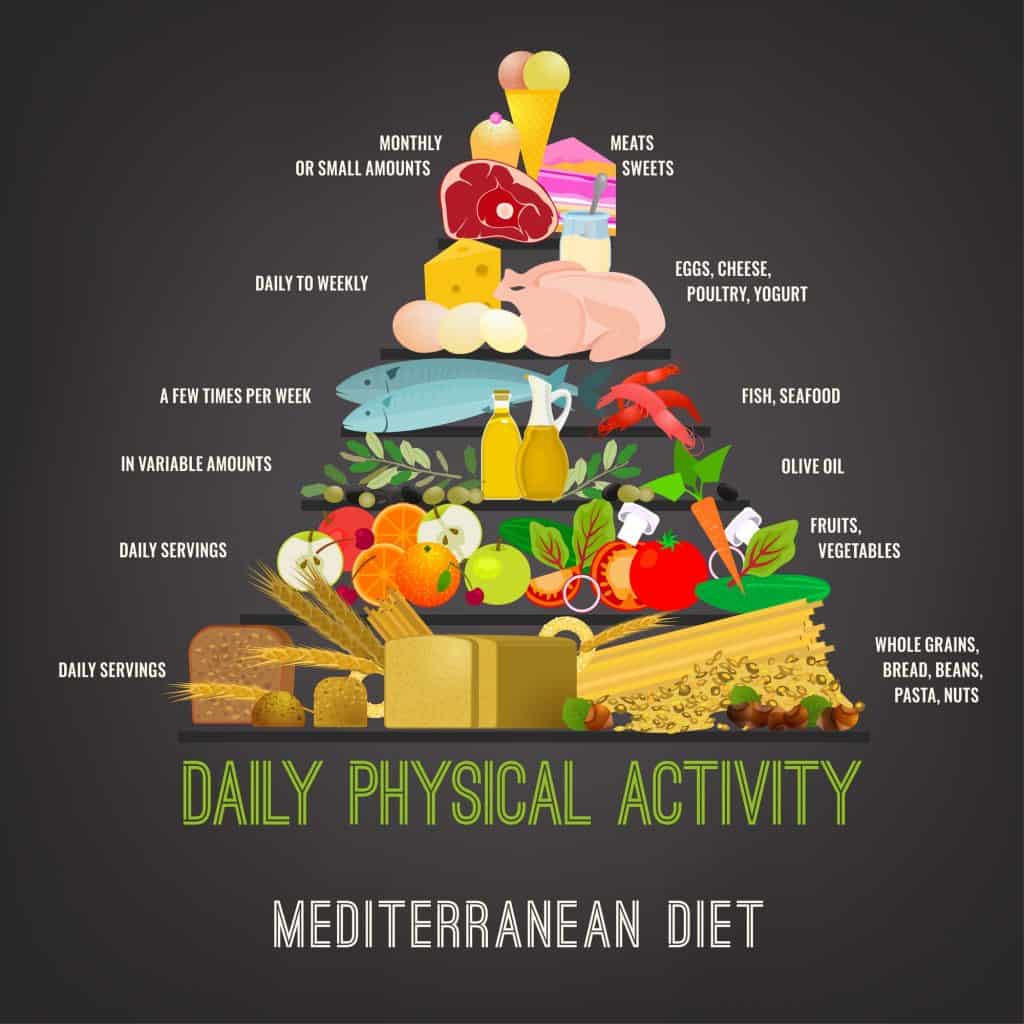
What Foods Are Not Allowed On The Mediterranean Diet?
Unlike other popular diets like the keto diet or paleo diet, there aren’t any foods that you actually must avoid in the Mediterranean diet.
As you can see, the 5th level of the pyramid allows you to eat meats and sweets, although sparingly.
With that said, here is a list of foods you should try to avoid:
- Non-water beverages (such as juice and sodas)
- Added sugars such as those in cookies, cake, muffins, etc
- White bread, bagels, and regular pasta
- Processed meats such as pepperoni, cold cuts, hot dogs
- Any oils except olive oil and avocado oils
How To Start a Mediterranean Diet
Alright, now let’s go over how to follow a Mediterranean diet.
Keep in mind that there is no one way to follow a Mediterranean lifestyle.
That’s what makes this diet so great. You can take these guidelines and tailor the diet to whatever you want it to be.
1) First things first, you should base almost every meal with some type of vegetable
Start off with leafy greens such as spinach, kale, arugula, and chard. Then you can include broccoli, carrots, onions, peppers, cauliflower and everything else in between.
Buy plenty of vegetables. They are the perfect side dish because they go with anything and everything.
Don’t like how vegetables taste? Then sauté them with herbs and spices.
2) The next thing you want to do is buy plenty of healthy fat.
Olive oil, Avocado oil, coconut oil, all of the various nuts and kinds of nut butter, avocados, and all types of seeds.
These are going to be your toppings and your snacks.
One of the easiest things you can do is drizzle olive oil onto your meal to give it a little extra flavor and a lot of nutrition.
3) The last component of the diet is your protein and carbohydrate sources
For animal sources of protein, get a varied assortment of fatty fish, which you will consume at least twice a week, and lean poultry which you will consume in small quantities.
For plant-based sources, use high protein legumes such as lentils, green split peas, and garbanzos.
We always get ours from Amazon.
The carbohydrate is always easy. Stick with whole wheat grains such as brown rice, farro, quinoa, whole wheat bread, and whole-wheat pasta.
4) Feel free to use dairy products at your discretion.
If you are going to do so, get the grass-fed organic options.
They are much more expensive but are probably worth the extra investment.
5) Never forget to be well-rounded
Diet is only one component of health.
The base of the pyramid encourages you to include physical activity and social interaction in your everyday life!
Mediterranean Diet Shopping List
As a busy professional, it is difficult to go food shopping often. So when going food shopping, it is best to buy enough food to last you at least 2 weeks.
Here is a quick shopping list you may find helpful.
- 32 ounces of extra virgin olive oil (will last a lot longer than 2 weeks)
- 6-8 packs of mixed frozen vegetables (easy to store, easy to cook)
- A handful of fresh fruit of your choosing (apples, bananas, oranges are my go to’s)
- A handful of fresh vegetables of your choosing (spinach, kale, broccoli are my go to’s)
- 2 packs of mixed frozen berries
- A 20-ounce container of mixed nuts
- 1 tub of Almond, Cashew, or any other nut butter
- 6 pack of Avocados (place them in the fridge for longer shelf life)
- 1 package of lentils, split peas, garbanzos, or black beans
- 1 lb of quinoa, or 1 box of whole wheat pasta
- 1 pack of whole grain bread
- 2 lbs of fatty fish
- 1-2 dozen organic eggs
- Seeds of your choice
- Herbs and spices of your choosing: We love this full set from Amazon.
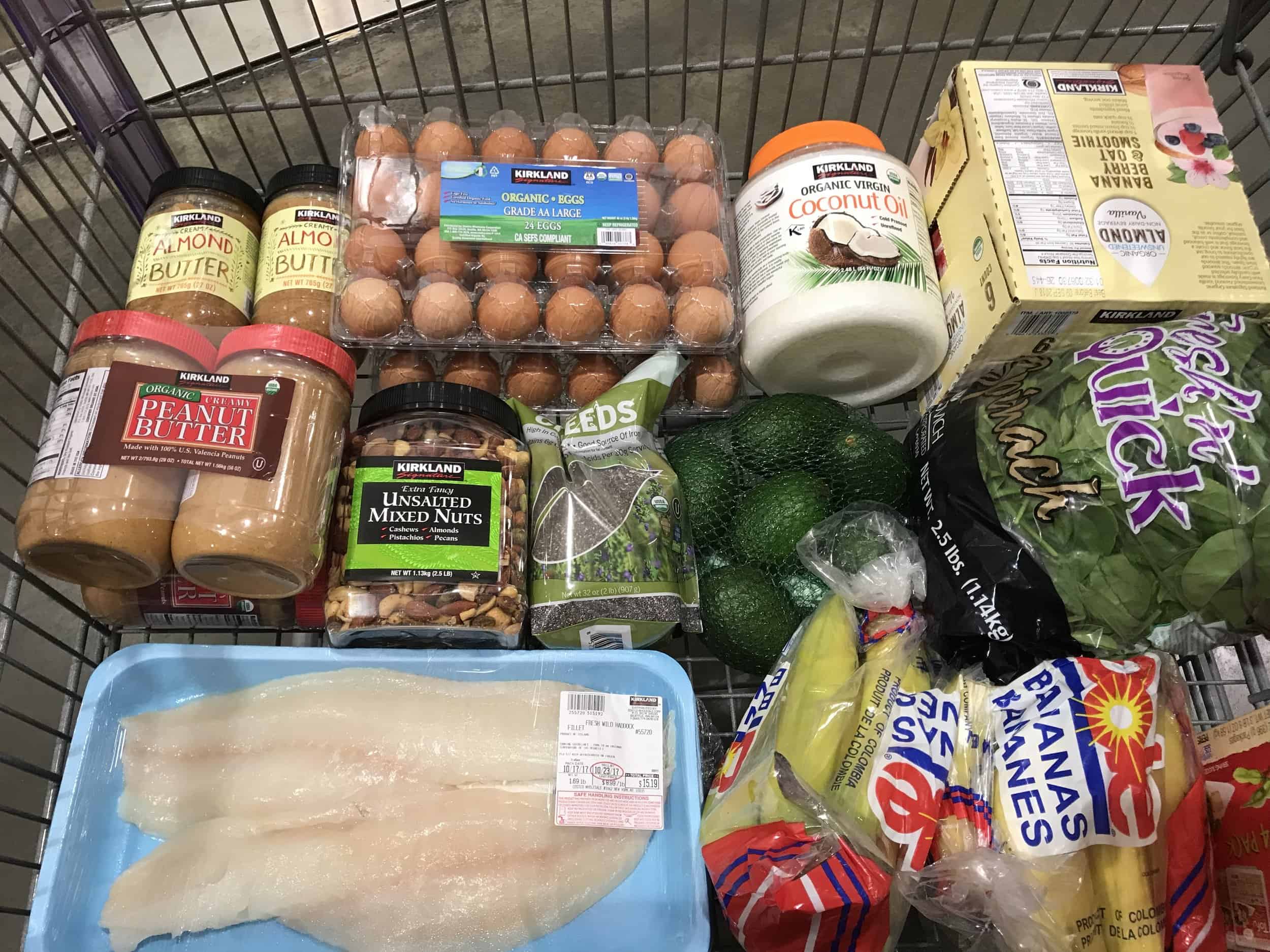
Our typical food cart with plenty of Mediterranean foods
What Do You Eat for Breakfast on a Mediterranean Diet?
Below, you will find a few sample breakfast, lunch, and dinner ideas you could try.
Mediterranean Diet Breakfast
Option A: 2 Eggs with peppers and olive oil with an apple on the side
Option B: Whole wheat toast with avocado, hummus and chia seeds
Option C: Oatmeal with berries, hemp seeds, and almond butter
Mediterranean Diet Lunch
Option A: Sweet Potatoes with grilled chicken dressed in olive oil
Option B: Shrimp salad with olive oil and sunflower seeds
Option C: Grilled salmon with quinoa and asparagus
Mediterranean Diet Dinner
Option A: Tuna on whole wheat wrap with vegetables and avocado
Option B: Portabello mushrooms with green split peas and olive oil
Option C: Red lentil pasta with pesto and grilled chickenk.
There are many ways you can get creative. Mix and match different foods from each food group to find an endless amount of variations to choose from.
Is The Mediterranean Diet Healthy?
Many healthcare providers are calling the Mediterranean diet the healthiest diet of them all.
It has been linked to numerous health benefits such as decreased heart disease, improvement in cholesterol levels, better glycemic control in diabetes and improvement in depression.
This is because the Mediterranean diet focuses primarily on plant-based sources and recommends foods that are
- heart-healthy,
- contain anti-oxidant properties and
- help you maintain a healthy weight.
Let’s go over each one a little further:
The Top Benefits Of The Mediterranean Diet
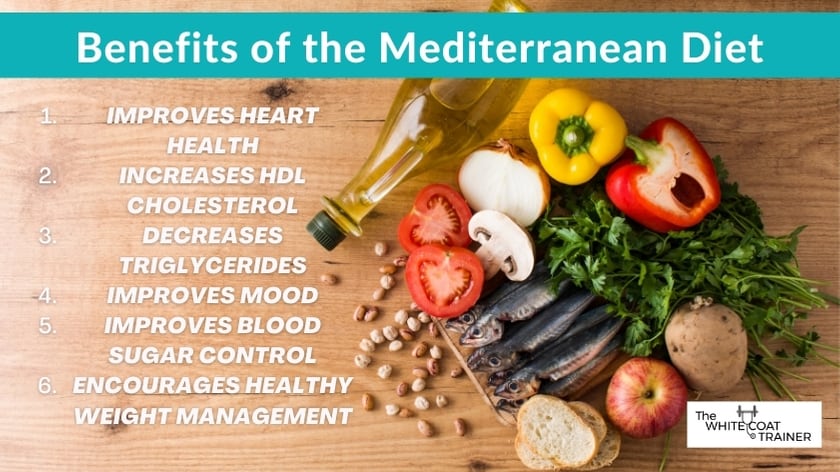
1) Decreases Heart Disease
The Mediterranean diet emphasizes a high intake of Omega-3 fatty acids.
The best Omega 3s are EPA, DHA, and ALA, all of which can be obtained from eating wild-caught fish, as well as different nut varieties.
These Omega-3s fatty acids can potentially reduce blood pressure and triglyceride levels.
In addition, the decreased intake of red meat and refined sweets further promote heart health as these foods have been linked to an increased risk of stroke and heart disease.
2) Cholesterol
Omega 3’s have also been found to increase HDL (“good cholesterol”) levels, as well as decrease Triglycerides (another molecule that is tested in the lipid panel).
In addition, some studies have found that Omega 3’s along with antioxidants found in olive oil could potentially slow the development of atherosclerosis in the arteries, however more research is needed.
3) Depression
Who would have known that Omega 3’s have also been linked to a decrease in depression and bipolar disorder?
As with most findings, more research is needed, but recent studies have been promising.
4) Diabetes
Last but not least, the Mediterranean Diet has been shown to improve blood sugar levels and insulin sensitivity.
This is because the diet advocates for numerous servings of vegetables and healthy fats in place of sweets, refined sugars, and other high glycemic carbohydrates.
A 4-year study showed that following a Mediterranean diet was superior to a low-fat diet in individuals with Type II Diabetes.
Other Related Questions
Can I Use The Mediterranean Diet To Lose Weight?
Yes, you can use the Mediterranean Diet to achieve any fitness goal you may have.
From a dietary perspective, weight loss requires three things
- avoiding excessive calories from nutrient-deprived foods
- high consumption of nutrient-dense foods from all three macronutrient sources
- adequate water consumption
The Mediterranean diet adequately satisfies all three of these requirements. *It is also important to note that diet is only one component of weight loss.
Given the complex nature of weight management, we have written an entire series on other weight-loss strategies which can be found here.
Is Peanut Butter OK On The Mediterranean Diet?
Peanut butter is okay to eat on the Med diet as long as it is natural peanut butter with no other ingredients such as added sugar and vegetable oils.
You can look for the word “natural” on the label, and you can look for oil separation at the top.
Is Coffee OK on The Mediterranean Diet?
Coffee and tea are ok to drink on this diet- but be sure to avoid adding any significant amount of processed/added sugars and sweeteners to them.
What Kind of Bread Can You Eat on Mediterranean Diet?
You can eat whole-grain bread (or sprouted grain bread) that has no added sugars.
My absolute favorite brand is Silver Bells.
Mediterranean Diet For Vegetarians
The Mediterranean lifestyle is one of the few diets that are vegetarian-friendly.
Given that the diet recommends that you limit your poultry and meat intake, it is easy to simply cut these food groups out altogether.
In addition, you can eliminate the fish and seafood as well and supplement with a high-quality Omega 3 supplement with high levels EPA and DHA.
As always, focus on getting your protein from sources such as legumes, nuts, seeds and some soy products such as edamame and tofu.
Does The WCT Recommend The Mediterranean Lifestyle?
Absolutely.
Out of all of the diets examined in this series, the Mediterranean diet is definitely the best diet.
This is because the Mediterranean diet isn’t actually a diet at all, rather it is a lifestyle.
We personally base most of our eating habits on the principles set forth by the Mediterranean way of life.
The White Coat Trainer Diet/ Meal Plan
In fact, we have prepared a comprehensive diet plan for busy professionals.
It outlines a step-by-step process on how to incorporate healthy eating habits and behaviors into your life.
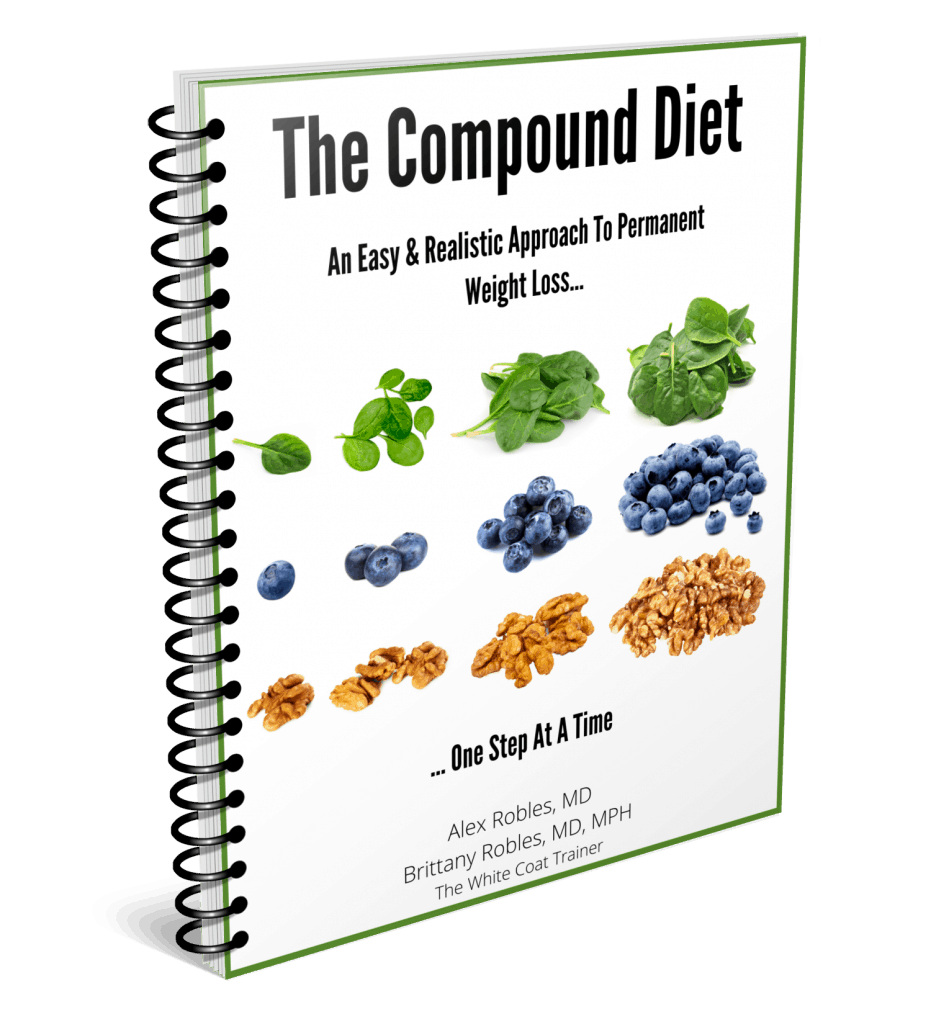
These are the same strategies that we use to lose over 10 lbs of fat and stick to our diet for 4+ years of medical school and residency training.
Just like the Mediterranean diet, our diet is not overly restrictive, and it is designed to be sustainable.
Research shows that people are generally more likely to stick with it since there aren’t any hard and fast rules.
What Do You Think Of My Med Diet Shopping List?
Whether you cook all of your meals at home or buy all of your food prepared, you can easily adhere to the Mediterranean guidelines.
At the end of the day, consuming less processed food and more Mediterranean foods can improve your health significantly.
Use this information to make an informed decision on what you will and will not eat.
Related Posts On Dieting:
- 3 Basic Principles of Diet Planning
- Intermittent Fasting: How To Decide If It’s Right For You
- How To Meal Prep For Beginners When You Have A Busy Schedule
What do you think of the Mediterranean Diet?
What healthy food do you need to add more of in your diet?
Comment below and let us know what you think.
P.S. Don’t forget to share this article if you found it useful!

Alex Robles, MD, CPT / Brittany Robles, MD, MPH, CPT
Alex & Brittany Robles are physicians, NASM Certified Personal Trainers, and founders of The White Coat Trainer: a resource dedicated to improving the health and fitness of busy professionals using time-efficient strategies. Their advice has been featured in My Fitness Pal, Prevention, Livestrong, Reader’s Digest, Bustle, The Active Times, and more. Learn more about them here.

3 ounces of cheese is my downfall.
Haha, I hear you. I used to love cheese as well.
I love Mediterranean diet.
I love Meditarenian food so much!
I always thought their diets included lots of carbs. haha Awesome post! Their cuisines are so tasty!
I think it depends on where you go, but in general they do have an appropriate mix of the three macronutrients. But yes, the cuisines are great!
Yes yes yes get all of this in my face! I could happily live on this diet ???
Haha, yes it is an amazing diet
I absolutely love your blog. I also like the fact that you did a series on diets. Thank you for sharing and I love all of the information that you provided.
Thank you very much. We appreciate the kind words! Let us know if there’s anything you would like us to cover.
I have try some of these diet but you have a great lists..
Thanks for reading.
This is the best explanation of the Mediterranean Diet I have seen, anxious to try it. Looking forward to learning, doing and sharing! Thank you!
I was just told this morning that at 41, almost 42, years of age I had a TIA and my LDL is elevated. I’m also diabetic, have seizures and migraines. I also have several back problems inducing neuropathy on my leg. I was about to start keto, until the phone call this morning. So after a lot of reading, I decided that this will be the way I go. I can’t eat fish or shellfish due to an allergy. So I will have to substitute that with legumes perhaps. But I’m looking forward to starting this new journey. I have 3 young kids who need me because my husband, their father, is clueless what to do with them! Lol.
I’m happy to hear that you are taking measures to improve your health through lifestyle modifications. Good luck and let us know how it goes!
R.K.G. I recently consulted with some neurologists from a major medical center in Chicago because I had a cerebellar stroke ( not TIA) that was so small it left me with no side effects. I was concerned because I’m nearing the age of my mother who was quite disabled fo life when she had her first stroke. I told these specialists that a few months prior to the stroke I was doing the Keto diet. I’m not sure I was doing it correctly but I was eating my fair share of healthy fats. Both doctors exclaimed, “No! Do the Mediterranean diet”. What is more colorful or flavorful than the Mediterranean diet? My only drawback is I don’t like fish. I am repulsed by it, always have been, don’t like the smell, etc. I’ll take fish oil capsules instead. As for the rest of it I’m in Heaven incorporating it into my daily life. I hope all goes well for you in your health quest! God bless you with good health!
Going back to basics and the way I was taught to eat, mainly at home.
The feel good food is always filling and satisfying.
I never did understand calories, carbs, Keto, quinoa etc.
Vegetables with every meal is the way to go or and fruits.
I remember my mother boiling a meat bone right after breakfast and getting it ready for supper. A very small amount of meat fell off the bone, maybe the size of her fist, that would feed all 6 of us and sometimes more.
There was always a variety of food choices such as vegetarians,
finger foods, raw foods and a once a week meat dish either on the bbq or a roast in the oven.
Olives were always accompanied by a vegetable as well as protein dips such as humus.
Afternoon snacks at tea time consist of a variety of nuts (walnuts being my favourite) and dry fruits especially raisins gramma’s favourite.
I don’t call & know myself as authentic when it comes to cooking but rather a prairie homemade cook that my family & friends all appreciate.
When food was consumed and you full giving thanks was very rewarding.
Couldn’t agree more!
Fish are a cornerstone of the Mediterranean diet. Aim to eat more fish than other meat protein sources. Use Seafood Watch recommendations to help determine the best choices for the environment.
Love the idea of the Mediterranean diet lifestyle. Always loved vegetables. Did not see on your list but love buckwheat. How does it fare on this diet? I believe this will also help me with not using salt. Not allowed much salt .
Hi Barbara
Any of those whole grains would be a great addition to the diet!
I ve notice that most of the Mediterranean recipes are high in carbs? I ve grown up on low carbs are best? Could you explain the difference.
There are definitely different schools of though on carbohydrate consumption. Data shows you can do well on either low carb or low fat diets. I personally dont like to limit carbs or fats. I eat them both abundantly. The most important thing is that you limit low quality carbs and fats – you know the kind – fried foods, cakes, pastries etc